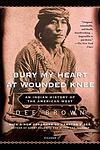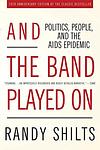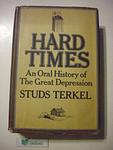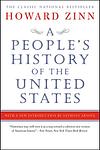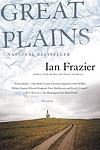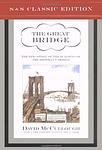The Greatest American "Nonfiction, History" Books Since 1970
Click to learn how this list is calculated.
This list represents a comprehensive and trusted collection of the greatest books. Developed through a specialized algorithm, it brings together 290 'best of' book lists to form a definitive guide to the world's most acclaimed books. For those interested in how these books are chosen, additional details can be found on the rankings page.
Genres
The category of "History" in books refers to the study and interpretation of past events, societies, and cultures. It encompasses a wide range of topics, including political, social, economic, and cultural developments, as well as the lives of individuals and groups who have shaped the course of history. History books can be written from various perspectives and may focus on specific time periods, regions, or themes. They aim to provide readers with a deeper understanding of the past and its impact on the present.
Countries
Date Range
Reading Statistics
Click the button below to see how many of these books you've read!
Download
If you're interested in downloading this list as a CSV file for use in a spreadsheet application, you can easily do so by clicking the button below. Please note that to ensure a manageable file size and faster download, the CSV will include details for only the first 500 books.
Download-
1. Dispatches by Michael Herr
This book is a first-hand account of the Vietnam War from a war correspondent's perspective. The author vividly describes the chaos, violence, and absurdity of the war, providing a raw and unfiltered look at the experiences of soldiers on the ground. The narrative is filled with gritty details and intense imagery, capturing the fear, boredom, and disillusionment that characterized the war. The book is considered a classic of war reportage, lauded for its honest and brutal portrayal of the realities of combat.
-
2. Bury My Heart at Wounded Knee by Dee Alexander Brown
This book is a compelling historical narrative that chronicles the systematic decimation of Native American tribes in the United States during the late 19th century. The author uses council records, autobiographies, and firsthand descriptions to provide a detailed account of the battles, massacres, and broken treaties that led to the destruction of the Native American way of life. The book centers on significant events such as the Battle of Little Bighorn and the Wounded Knee Massacre, offering a voice to the often overlooked Native American perspective.
-
3. The Making of the Atomic Bomb by Richard Rhodes
This comprehensive book provides an in-depth account of the development of the atomic bomb during World War II. It explores the scientific advancements that made the bomb possible, the political decisions that led to its creation, and the moral dilemmas faced by the scientists involved. The book also details the personalities of key figures in the Manhattan Project, the effects of the bomb on Hiroshima and Nagasaki, and the impact of nuclear weapons on the world.
-
4. Guns, Germs, and Steel by Jared Diamond
The book is a comprehensive exploration of the different trajectories of human societies throughout history. It argues that environmental factors, rather than racial or cultural differences, are the primary reason why some societies developed more advanced technology and political systems. The author uses a multidisciplinary approach, drawing from fields such as geography, evolutionary biology, and linguistics, to support his thesis. The book covers a wide range of topics, including the domestication of plants and animals, the invention of writing, and the spread of diseases.
-
5. The Great War and Modern Memory by Paul Fussell
"The Great War and Modern Memory" is a critical analysis of the impact of World War I on the English society and culture. The author explores the war's influence on literature, language, and symbolism, arguing that the horrific experiences of the war drastically altered public perception and understanding of conflict, honor, and heroism. The book combines literary criticism, history, and social commentary to provide a comprehensive examination of the war's lasting effects on the collective memory of the English-speaking world.
-
6. And the Band Played On by Randy Shilts
This book is a comprehensive chronicle of the emergence of the AIDS epidemic in the United States in the 1980s. It explores how the disease was initially ignored by many health professionals and politicians, leading to its spread and the deaths of thousands of people. The book also examines the impact of the disease on the gay community and the role of various institutions, including the medical community, the media, and the government, in responding to the crisis. It's a powerful critique of the indifference and negligence that allowed the disease to become a global pandemic.
-
7. Battle Cry of Freedom by James M. McPherson
"Battle Cry of Freedom" is a comprehensive exploration of the events leading up to, during, and following the American Civil War. The book delves into the political, social, and economic factors that led to the war, and examines the strategies, battles, and key figures of this pivotal period in American history. It also provides an in-depth analysis of the consequences of the war and its impact on the United States.
-
8. Hard Times: An Oral History of the Great Depression by Studs Terkel
This book is a compelling oral history of the Great Depression, featuring a collection of interviews from a diverse range of individuals who lived through the era. The interviewees include both the ordinary people and famous figures of the time, from businessmen and politicians to artists and criminals. The book provides a vivid, first-hand account of the economic hardship, social changes, and emotional struggles experienced by people during the 1930s, offering a unique perspective on this significant period in American history.
-
9. The Immortal Life of Henrietta Lacks by Rebecca Skloot
The book tells the story of Henrietta Lacks, a poor African American tobacco farmer whose cells, taken without her knowledge in 1951, became one of the most important tools in medicine, vital for developing the polio vaccine, cloning, gene mapping, and more. Henrietta's cells have been bought and sold by the billions, yet she remains virtually unknown, and her family can't afford health insurance. The book explores the collision between ethics, race, and medicine; of scientific discovery and faith healing; and of a daughter consumed with questions about the mother she never knew.
-
10. Roll, Jordan, Roll by Eugene Genovese
"Roll, Jordan, Roll" is a comprehensive exploration of slavery in the United States, specifically focusing on the complex relationships between slaves and their masters. The book examines how slaves managed to preserve their culture, humanity and dignity, while also highlighting the paradoxical nature of a system where slave owners were dependent on their slaves for their livelihoods. It delves into the ways in which slaves resisted their oppression, and the strategies they employed to survive and create their own communities within the confines of the brutal institution of slavery.
-
11. The Devil In The White City by Erik Larson
This book intertwines the true tales of two men during the 1893 Chicago World's Fair: Daniel H. Burnham, the architect responsible for the fair's construction, and H.H. Holmes, a serial killer masquerading as a charming doctor. The narrative alternates between the story of Burnham, his challenges and successes in building the fair, and the chilling story of Holmes, who used the fair to lure his victims to their death. It's a vivid portrayal of the Gilded Age and a chilling exploration of one of America's first known serial killers.
-
12. The Last Lion by William Manchester
"The Last Lion" is a comprehensive biography of Winston Churchill, providing an in-depth look at his life, from his birth in 1874 to his death in 1965. The book covers Churchill's early years, his military service, his time as a journalist, and his political career, including his role as British Prime Minister during World War II. It also delves into his personal life, relationships, and struggles with depression. The book presents a nuanced portrayal of Churchill, highlighting his strengths, flaws, victories, and defeats.
-
13. Into the Wild by Jon Krakauer
This striking narrative non-fiction tells the real-life story of a young man who turns his back on society to live in the Alaskan wilderness. Despite a privileged background and a promising future, he donates his savings to charity, abandons his car and most of his possessions, and embarks on a journey into the wild. His solitary existence in the wild, his struggles for survival, and his untimely death provide a profound exploration of the allure of wilderness and the human yearning for solitude and self-discovery.
-
14. Up in the Old Hotel by Joseph Mitchell
"Up in the Old Hotel" is a collection of essays that paints a vivid picture of New York City from the 1930s to the 1960s. The stories introduce a rich tapestry of characters, from street preachers and gypsies to oystermen and bar regulars, each with their own unique history and perspective. The book captures the essence of the city and its inhabitants in a way that is both deeply personal and universally relatable, providing an intimate look at a bygone era.
-
15. The Warmth Of Other Suns by Isabel Wilkerson
"The Warmth of Other Suns" is a powerful and deeply moving narrative that chronicles the Great Migration, a significant event in American history that saw millions of African Americans leave the South in search of better opportunities and freedom from racial oppression. Through the compelling stories of three individuals, the book explores the challenges, triumphs, and sacrifices made by these courageous migrants as they embarked on a journey to find a new life in the North and West, ultimately reshaping the social and cultural landscape of America.
-
16. Team of Rivals: The Political Genius of Abraham Lincoln by Doris Kearns Goodwin
This book explores the political acumen of Abraham Lincoln, focusing on how he assembled his cabinet from political adversaries, many of whom initially dismissed him for his perceived lack of experience and ungainly appearance. The narrative delves into how Lincoln used his rivals' talents to navigate the tumultuous times of the Civil War, maintaining unity and leading the nation towards the abolition of slavery. It underscores Lincoln's extraordinary ability to turn rivals into allies, demonstrating his leadership and his profound impact on American history.
-
17. A People's History of the United States by Howard Zinn
This book is a comprehensive overview of American history from the perspective of the marginalized and underrepresented groups, rather than the typical focus on political elites. It covers a wide range of historical events and periods, including the discovery of the continent, the founding of the United States, slavery, the Civil War, and up to the modern era. The book challenges traditional narratives and provides a critical and thought-provoking look at the nation's past.
-
18. The Looming Tower by Lawrence Wright
"The Looming Tower" is a comprehensive historical examination of the events leading up to the 9/11 terrorist attacks on the United States. It delves into the origins of Al-Qaeda, the rise of Osama bin Laden, and the failure of U.S. intelligence agencies to prevent the attacks. The narrative is extensively researched and provides a detailed account of Islamic fundamentalism, the complex politics of the Middle East, and the role of the United States in the region. The book also explores the personal stories of key figures on both sides of the conflict.
-
19. Great Plains by Ian Frazier
"Great Plains" is a travelogue that takes readers on a journey through the vast expanse of the American Great Plains, exploring its history, geography, and culture. The author travels from North Dakota to Texas, delving into the history of Native Americans, pioneers, and outlaws. The book provides a detailed account of the region, its people, and its significance in shaping the American West, offering a vivid portrait of the landscape and its influence on the country's identity.
-
20. Cosmos by Carl Sagan
This landmark book is a majestic cosmic tour that delves into the nature of the universe, exploring a vast array of topics including the science of space and time, the origins of life, and the human quest for understanding. It intertwines science and philosophy, taking readers on a journey through the history of astronomy, the development of the scientific method, and the incredible vastness of the cosmos. The narrative is infused with a sense of wonder and awe at the complexity and beauty of the universe, as well as a thoughtful consideration of the place of humanity within it. The work is a celebration of human curiosity and a powerful advocate for the importance of science and education in helping us to understand our world and our place in the cosmos.
-
21. There Are No Children Here by Alex Kotlowitz
The book follows the lives of two young African-American brothers growing up in a public housing complex in Chicago during the 1980s. The narrative portrays their daily struggles with poverty, violence, and the drug trade, while also highlighting their dreams and hopes for a better future. The book provides an intimate and heartbreaking look at the harsh realities of inner-city life, systemic racism, and the failure of public institutions to support vulnerable communities.
-
22. Great Bridge by David McCullough
This book is a detailed account of the construction of the Brooklyn Bridge, one of the most significant and iconic landmarks in New York City. It provides an in-depth look at the political, architectural, and personal challenges faced during its 14-year construction period in the late 19th century. The narrative also explores the lives of the Roebling family, who were the chief engineers and designers of the bridge, along with the societal changes and technological advancements of the era.
-
23. In the Heart of the Sea by Nathaniel Philbrick
This historical narrative tells the true story of the 19th-century whaleship Essex, which was rammed and sunk by a sperm whale in the South Pacific. Stranded thousands of miles from land, the crew of the Essex was pushed to their limits and forced to do the unthinkable to stay alive. The tale explores the harrowing ordeal of these men through their long journey at sea, their encounters with nature's fury, hunger, disease, and their own fear and despair.
-
24. The Death of Woman Wang MMP by Jonathan Spence
"The Death of Woman Wang MMP" is a historical narrative that vividly portrays 17th-century rural China, specifically the T'an-ch'eng county in Shantung province. The book focuses on the lives of ordinary people, their struggles, and the harsh realities they face, using the tragic story of a woman named Wang as the central narrative. It also provides a detailed account of the local judicial system and the role of the local historian, all of which are interwoven to create a comprehensive picture of the society and culture of the era.
-
25. Rising Tide by John Barry
"Rising Tide" is a historical account that explores the impact of the Great Mississippi Flood of 1927 on American society. The narrative details the catastrophic event and the subsequent political and social changes that occurred, including the shift in African American voting patterns from the Republican to the Democratic party. The book also delves into the engineering efforts to control the Mississippi River and the environmental consequences of such efforts.
Reading Statistics
Click the button below to see how many of these books you've read!
Download
If you're interested in downloading this list as a CSV file for use in a spreadsheet application, you can easily do so by clicking the button below. Please note that to ensure a manageable file size and faster download, the CSV will include details for only the first 500 books.
Download
